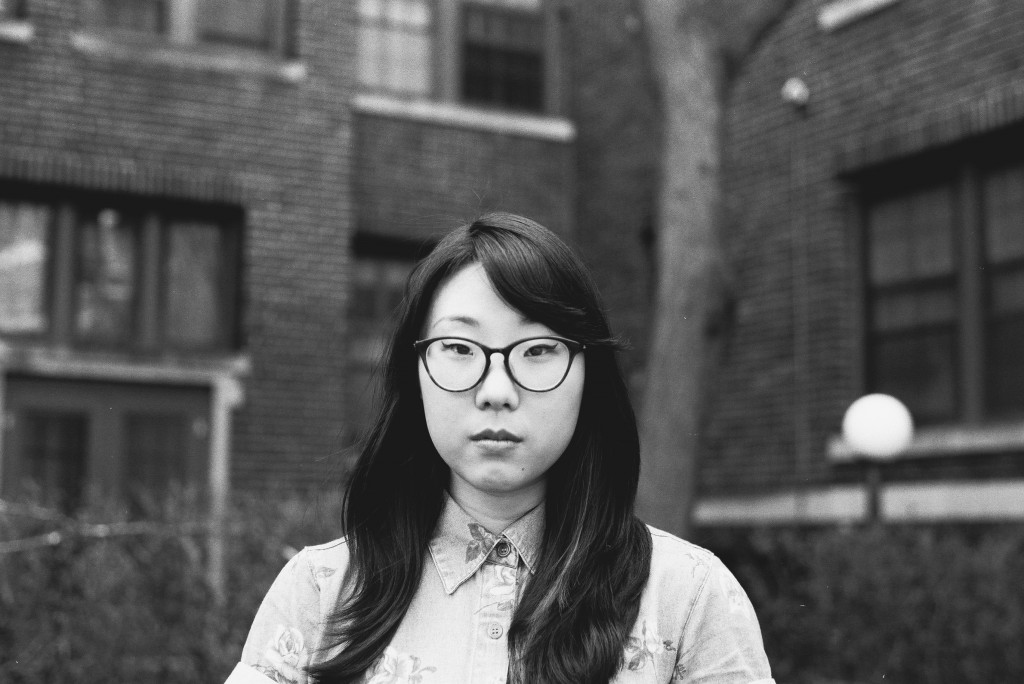
What world a world without police look like?
Poet Franny Choi’s work attempts to answer that question, exploring the ways that power, specifically in the realms of race, class and gender, operate in U.S. systems and institutions.
Poetry is uniquely situated to expose what many people consider to be “unspeakable” forces of violence and erasure within those systems, Choi said.
“When people of color are being murdered by the police with impunity, and when queer and trans folks are being murdered and being incarcerated for trying to defend their own lives, and when immigrants are being deported at record high rates, and when there’s a presidential candidate who proposes having a national Muslim database, it seems like there are a lot of forces in the world that tell me, and people who are similarly outside the norm of a ‘default human,’ that we need to apologize for existing,” she said.
Those norms can also play an oppressive role in the world of poetry, she said. In a recent incident, poet Michael Derrick Hudson, a white man, was accepted into the prestigious “The Best American Poetry 2015” anthology under the Chinese female pseudonym “Yi-Fen Chou.” Hudson described the pseudonym as a tool he used to get published, prompting criticism and outrage from many in the poetry community.
“An Asian woman was basically erased and used as a mask for a white man to put on for his own personal gain,” Choi said. “It lit a fire under me to keep writing.”
That writing is heavily influenced by Choi’s work as a community organizer in Providence on issues of police accountability and racial profiling, she said. For Choi, that work has brought an urgency to imagining alternatives to the current police system, as well as questions about the specifics: “When [organizers] say we want abolition of prisons and cops, what do we envision in its place?” she said.
An answer began to take form for her after reading Ursula K. Le Guin’s novel “The Dispossessed,” which chronicles life in a utopic society. “I felt like it was a door in my brain opening up,” she said.
“Field Trip to the Museum of Human History” depicts part of that answer, showing a group of students who learn about the modern-day U.S. in a future where police have been abolished. To this group, police brutality and class inequality are antiquated horrors of the past.
“The idea of the children of my child looking at the messed-up things about this world from the other side of a glass was very appealing to me,” she said. “I thought of some of the youth organizers that I stand in solidarity with, and the idea of them and their future generations being able to do that was really exciting.”
The type of high-level view of police reform that the poem explores can be useful for activists facing the threat of burnout, she said. “We get bogged down, as organizers, [by] the details of the everyday,” she said. “[We] are focusing on such tiny concrete gains and victories that sometimes it’s hard to zoom out and think about what we’re actually working toward.”
Hear Choi read “Field Trip to the Museum of Human History,” or read the poem below.
Field Trip to the Museum of Human History
Everyone had been talking about the new exhibit,
recently unearthed artifacts from a time
no living hands remember. What twelve year old
doesn’t love a good scary story? Doesn’t thrill
at rumors of her own darkness whispering
from the canyon? We shuffled in the dim light
and gaped at the secrets buried
in clay, reborn as warning signs:
a “nightstick,” so called for its use
in extinguishing the lights in one’s eyes.
A machine used for scanning fingerprints
like cattle ears, grain shipments. We shuddered,
shoved our fingers in our pockets, acted tough.
Pretended not to listen as the guide said,
Ancient American society was built on competition
and maintained through domination and control.
In place of modern-day accountability practices,
the institution known as “police” kept order
using intimidation, punishment, and force.
We pressed our noses to the glass,
strained to imagine strangers running into our homes,
pointing guns in our faces because we’d hoarded
too much of the wrong kind of property.
Jadera asked something about redistribution
and the guide spoke of safes, evidence rooms,
more profit. Marian asked about raiding the rich,
and the guide said, In America, there were no greater
protections from police than wealth and whiteness.
Finally, Zaki asked what we were all wondering:
But what if you didn’t want to?
and the walls snickered and said, steel,
padlock, stripsearch, hardstop.
Dry-mouthed, we came upon a contraption
of chain and bolt, an ancient torture instrument
the guide called “handcuffs.” We stared
at the diagrams and almost felt the cold metal
licking our wrists, almost tasted dirt,
almost heard the siren and slammed door,
the cold-blooded click of the cocked-back pistol,
and our palms were slick with some old recognition,
as if in some forgotten dream we did live this way,
in submission, in fear, assuming positions
of power were earned, or at least carved in steel,
that they couldn’t be torn down like musty curtains,
an old house cleared of its dust and obsolete artifacts.
We threw open the doors to the museum,
shedding its nightmares on the marble steps,
and bounded into the sun, toward the school buses
or toward home, or the forests, or the fields,
or wherever our good legs could roam.
Franny Choi is a writer, teaching artist, and the author of Floating, Brilliant, Gone (Write Bloody Publishing, 2014). She has received awards from the Poetry Foundation and the Rhode Island State Council on the Arts. Her work has appeared or is forthcoming in Poetry Magazine, The Journal, Rattle, Indiana Review, and others. She is a VONA alumna, a Project VOICE teaching artist, and a member of the Dark Noise Collective. Audio edited by Brigid Choi.
ncG1vNJzZmivp6x7sa7SZ6arn1%2Bjsri%2Fx6isq2eRp8G0e8%2BonK2qqWS9sLHTZp2rmZ6jxm6vx6igZqiZmMG2vsSsZJplp6S%2FrbCMsKCtoJ%2BqwW68zqWgnJ0%3D